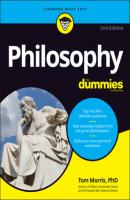Philosophy For Dummies. Tom Morris
Чтение книги онлайн.

Читать онлайн книгу Philosophy For Dummies - Tom Morris страница 11
Название: Philosophy For Dummies
Автор: Tom Morris
Издательство: John Wiley & Sons Limited
Жанр: Афоризмы и цитаты
isbn: 9781119875697
isbn:
Philosophy, on the other hand, as an activity of reflection giving rise to a wiser way of life, involves investing your life energies in something that may prove worth the cost. But it’s not easy. The activity of self-examination and developing the self-knowledge that results from it can be quite hard. The great novelist Cervantes once acknowledged this in an extreme though accurate way when he advised: “Make it your business to know yourself, which is the most difficult lesson in the world.” Pondering this, you might of course also begin to wonder whether the examined life is ion the end itself guaranteed to be worth living. And the truth is that Socrates never actually said so. His statement about the unexamined life does seem to imply, by contrast, such a conviction. But the wise philosopher left us to draw that ultimate conclusion on our own, precisely by examining ourselves and our own lives. And I hope that what you find in this book helps show you the true worth of such an examination.
Asking The Deeper Questions
In this book, you get to look at some incredibly interesting questions dealing with issues of belief, skepticism, and knowledge; good and evil; free will and determinism; the nature of a person; death and life after death; the existence of God; the truth about success and happiness; and the meaning of life. As children, we were endlessly curious about life. And as we age, that should not stop. Philosopher John Locke once wrote: “There is frequently more to be learned from the unexpected questions of a child than then discourses of men, who talk in a road, according to the notions they have borrowed and the prejudices of their education.” In these pages you get a chance to explore some of those questions once more.
This book touches on many of the main fields of philosophy — epistemology, ethics, metaphysics, and the philosophy of religion. And it consults many of the great thinkers in history. Throughout, the discussion will be as practical as it is theoretical, because I believe that the best use of theory is in better practice. With each issue, you should ask what difference it makes in your own life, and how it can help you to chart your way forward in the world.
How can we really know anything?
What is the importance of rationality to a good life?
What does the word “good” really mean?
Is ethics just a matter of opinion, or do objective moral rules exist that bind everyone?
Why should we be moral?
Why do people disagree so much on ethics?
Are people really free, or are our actions all determined by genetics and environment?
Can anyone predict the future, in principle, in every detail?
What’s the difference between a human being and a robot?
Do people have souls, or are we just physically complex organisms?
What is death?
Why is death so feared by so many people?
Do we somehow still exist after death?
Where does the concept of God come from?
Does a God really exist?
Why does the world contain so much evil?
Can anyone prove what the truth is on such ultimate issues, or must we accept them just as matters of faith?
What, for that matter, is faith?
What is the meaning of life?
How can people have true success and actually be happy?
These questions cover only a few of the basic concepts that I consider with you throughout this book. Ultimately, I hope to help you ask your own questions a little better, or a bit more deeply, and perhaps even come to some revelatory and satisfying answers. As the famous novelist James Thurber once pointed out, “It is better to ask some of the questions than to know all of the answers.” Asking the right questions well, and living with them, can enhance our lives.
Chapter 2
Philosophy as an Activity
IN THIS CHAPTER
Philosophy is not a theory but an activity.
— Ludwig Wittgenstein (1889–1951)
Philosophy at its best is an activity more than a body of knowledge. In an ancient sense, done right, it’s a healing art. It’s intellectual self-defense. It’s a form of therapy. But it’s also much more. Philosophy is map-making for the soul, cartography for the human journey. It’s an important navigational tool for life that too many modern people try to do without.
In this chapter, we see exactly what that activity is, as well as how to do it well. I show you the power that belief can have in our lives, and I bring you a distinction Plato drew so vividly that it has echoed down the centuries, helping to free people from illusion and lead them into truth.
Adventuring for the Mind
Philosophy can be a little like a version of the wilderness adventure trekking of Outward Bound for the mind: intellectual spelunking, mental rock climbing, cognitive rappelling, rafting, and reconnoitering. Sometimes, it can even seem like a conceptual version of Extreme Sports.
On those occasions when we push philosophical inquiry to the very limits of our world-views, we find ourselves temporarily letting go of our customary assumptions, intellectually free-falling and hoping the chute will open when we need it. Anytime we do this, the point is to experience the outer boundaries and foundations of our ordinary beliefs, to come to understand the status of our most important presuppositions, those background convictions that support the perspectives and decisions governing our day-to-day actions, and that we normally just take for granted.
We question things as deeply as we can in order to understand as deeply as we can. The ultimate СКАЧАТЬ